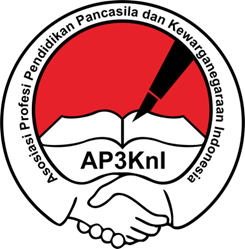Pre-voters' Political Education Activities at the Election Smart House amidst the Covid-19 Pandemic
DOI: https://doi.org/10.26618/jed.v7i3.7938
Political Education, Pre-voters, Election Smart House, Covid-19 Pandemic
Abstract
Pre-voters are a group that will prepare to become novice voters in the next few years; it is important to prepare them to become intelligent and rational voters, one of which is through the existence of the Election Smart House. The research design employed a qualitative descriptive method. The researcher describes in-depth and comprehensively the activities of pre-voter political education at the Election Smart House of the Pekanbaru City of General Elections Commission during the Covid-19 pandemic. Data collection was carried out through observation, interviews, and documentation. Research informants include the commissioner of the General Election Commission of Pekanbaru City, the Elecivicction Smart House of Pekanbaru City manager, and Pancasila and Civic Education teachers teaching at Senior High Schools in Pekanbaru City. The results showed that during the Covid-19 pandemic, from 2020 until now, the activities in the Election Smart House were not very active. It was noted that during the pandemic in the last two years, there were no visits from students to the Election Smart House of the Pekanbaru City owned by the General Elections Commission or visits from the City’s Election Smart House to high schools in Pekanbaru. Therefore, to overcome this situation, the Election Smart House manager initiated a creative idea by procuring Voter Education Podcasts in the Election Smart House by inviting resource persons and broadcasting them through the Pekanbaru City KPU (General Election Commission) YouTube channel. This activity is one way to educate the public without violating the health protocol and an effort to keep the Election Smart House as the center of community political education, especially students as pre-voters.References
Abdul Muiz Ruslan, Utsman. (2000). Pendidikan Politik Ikhwanul Muslimin. Solo: Era Intermedia.
Agung, I. M. (2020). Memahami Pandemi Covid-19 Dalam Perspektif Psikologi Sosial. Psikobuletin:Buletin Ilmiah Psikologi, 1(2), 68. https://doi.org/10.24014/pib.v1i2.9616
Aprilia, C. R., & Azmi, A. (2021). Sosialisasi Pemilu Tahun 2019 Terhadap Pemilih Pemula oleh KPU Kabupaten Solok Selatan. Journal of Civic Education, 4(1), 32–38. https://doi.org/10.24036/jce.v4i1.439
Handoyo, D. E., & Lestari, P. (2017). Pendidikan Politik. Percetakan Pohon Cahaya, 1–192.
Hariyanti. (2015). pelaksanaan pendidikan pemilih melalui kerjasama kpu kota padang dengan MGMP PKn SMA/MA Kota Padang. universitas negeri padang.
Hariyanti, H., & Sari, F. A. (2021). Election Smart House (ESH) as a Pre-Voter Political Education Facility To improve the quality of democracy. JED (Jurnal Etika Demokrasi), 6(1), 1–11. https://doi.org/10.26618/jed.v6i1.3940
Iskandar, D., & Marlina, N. (2019). Pendidikan Pemilih Muda Cerdas Di Kabupaten Boyolali. Jurnal Pengabdian Vokasi, 01(01), 12–18. https://ejournal2.undip.ac.id/index.php/jpv/article/view/4713
Kurniadi, Y U., et al. (2020). Nusantara ( Jurnal Ilmu Pengetahuan Sosial ). Nusantara: Jurnal Ilmu Pengetahuan Sosial, 7(2), 408–420.
Manik, Husni Kamil, sigit pamungkas, dkk. (2015). Buku Pedoman Rumah Pintar Pemilu (Issue 29).
Manik, H. K., & Budhiati, I. (2015). Pedoman pendidikan pemilih. Komisi Pemilihan Umum Republik Indonesia.
Mullins, R. D. (2016). A review of The Political Classroom: Evidence and Ethics in Democratic Education. Journal of Social Studies Research, 40(2), 165–167. https://doi.org/10.1016/j.jssr.2015.06.011
Persson, M., Lindgren, K. O., & Oskarsson, S. (2016). How does education affect adolescents’ political development? Economics of Education Review, 53, 182–193. https://doi.org/10.1016/j.econedurev.2016.03.015
Rafni, A., & Suryanef. (2019). Pendidikan Pemilih bagi Pemilih Pemula Melalui Rumah Pintar Pemilu. Jurnal Of Moral and Civic Education, 3(1), 1–8.
Rahmatunnisa, M. (2017). MENGAPA INTEGRITAS PEMILU PENTING? (Vol. 3, Issue 1).
Rozuli, A. I., & Haboddin, M. (2018). Pendidikan Pemilih dan Penguatan Demokrasi. 1(2), 129–148.
Surbakti, R. (2011). Penanganan pelanggaran pemilu.
wisnu dani prasetyo, toni harsan, P. (2019). partisipasi politik pemilih pemula dalam pemilu 201 di kelurahan sumber kecamatan banjarsari kota surakarta. CIVICS EDUCATION AND SOCIAL SCIENSE JOURNAL(CESSJ) Volume 1 Nomor 2 Bulan Desember 2019, 1, 70–93.
Yoldaş, Ö. B. (2015). Civic Education and Learning Democracy: Their Importance for Political Participation of Young People. Procedia - Social and Behavioral Sciences, 174(286), 544–549. https://doi.org/10.1016/j.sbspro.2015.01.703
Zendrato, W. (2020). Gerakan Mencegah Daripada Mengobati Terhadap Pandemi Covid-19. Jurnal Education and Development, 8(2), 242–248.



